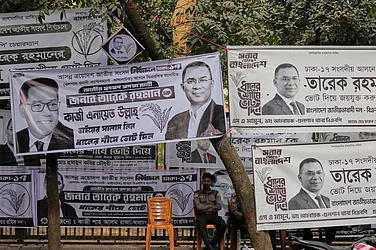The International Court of Justice (ICJ) has begun its public hearings on South Africa’s allegations of genocide against Israel following the ongoing war in Gaza. In December, last year, South Africa filed a lawsuit against Israel, in a move welcomed by several countries amid a global chorus for a ceasefire in Gaza. While the court heard the hearings of the petitioners on January 11, it is hearing Israel’s side on January 12 at the Peace Palace in the Hague, Netherlands.
The ICJ, the United Nations’ top court, has been asked to consider whether Israel has been committing genocide on Gaza since October 7 as alleged by South Africa. Since Israel launched its military campaign against Hamas in response, more than 23,357 people, mainly women and children, have been killed in Gaza, according to the Hamas-run health ministry. Additionally, the evidence submitted by South Africa claims "acts and omissions" by Israel "are genocidal in character because they are intended to bring about the destruction of a substantial part of the Palestinian national, racial and ethnical group".
Israel has, however, rubbished the charges as “baseless” with Israeli Prime Minister Benjamin Netanyahu saying, "No, South Africa, it is not we who have come to perpetrate genocide, it is Hamas.”
What is ICJ and what is genocide?
The principal organ of the United Nations, the ICJ is composed of 15 judges, who are elected for terms of office of nine years by the United Nations General Assembly and the Security Council.
Unlike the International Criminal Court (ICC), the ICJ cannot prosecute individuals for crimes of the utmost severity, such as genocide. However, the opinions of the ICJ carry weight with the UN and other international institutions.
The definition of the crime of genocide as contained in Article II of the Genocide Convention, of 1948, genocide means any of the following acts committed with the intent to destroy, in whole or in part, a national, ethnical, racial or religious groups, such as -- killing members of the group, causing serious bodily or mental harm to members of the group, deliberately inflicting on the group conditions of life calculated to bring about its physical destruction in whole or in part, imposing measures intended to prevent births within the group, and forcibly transferring children of the group to another group.
Since its inception in 1954 by the Charter of the United Nations, the ICJ has addressed nearly four cases of allegations of genocide under the Convention on the Prevention and Punishment of the Crime of Genocide dating back as early as 1950
As the ICJ begins its public hearings in the case South Africa v. Israel, here’s a recap of the number of times, States’ allegations of genocide reached the top court.
1. Reservations to the Convention on the Prevention and Punishment of the Crime of Genocide (1950)
In this first advisory case, the United General Assembly had proposed a few questions to the ICJ regarding the provisions of reservations to the Convention on the Prevention and Punishment of the Crime of Genocide. In November 1950, the General Assembly sought the court’s opinion on the position of a State which attached reservations to its signature of the multilateral Convention, if other States, signatories of the same Convention, objected to these reservations.
In its May 28, 1951, Advisory Opinion, the court observed that even if a convention contained no articles on reservations, it would not mean that reservations were prohibited. Without giving an absolute answer, the court stated, “The character of the convention, its purposes and its provisions must be taken into account. It was the compatibility of the reservation with the purpose of the convention which must furnish the criterion of the attitude of the State making the reservation, and of the State which objected thereto.”
2. Application of the Convention on the Prevention and Punishment of the Crime of Genocide (Bosnia and Herzegovina v. Serbia and Montenegro) (1993)
On 20 March 1993, the Republic of Bosnia and Herzegovina instituted proceedings against the Federal Republic of Yugoslavia over concerns about alleged violations of the Genocide Convention. Following the Bosnian war, a claim was filed by Dr Francis Boyle, an adviser to Alija Izetbegović, the first President of the Presidency of the newly formed Bosnia and Herzegovina. Boyle alleged that Serbia had attempted to exterminate the Bosniak (Bosnian Muslim) population of Bosnia and Herzegovina during the war.
In a long-drawn case, the court declared Serbia guilty of violating the Genocide Convention. It was the first trial involving a nation charged with breaking the UN Convention on Genocide, but despite a mountain of evidence and peculiar diplomatic-political conditions, Serbia was not found guilty of carrying out the extermination campaign against the Bosniak people.
3. Application of the Convention on the Prevention and Punishment of the Crime of Genocide (Croatia v. Serbia) (1999)
Croatia and Serbia became separate states following the dissolution of the Federal Republic of Yugoslavia. Croatia claimed that Serbia had violated the Convention against Genocide between 1991 and 1995, in an application it submitted to the International Court of Justice (ICJ) in 1999. The application drew from events that followed Croatia's 1991 declaration of independence, including a battle between the country's armed forces and the forces of the ethnic minority of Serbians residing in Croatia at the time, as well as other paramilitary groups that opposed Croatia's independence. Croatia said that when Serb forces seized control of one-third of its territory, genocide had occurred. Croatia managed to retake its previous territory in the spring and summer of 1995. Serbia based its counterclaim on alleged genocidal events that occurred during the spring and summer of 1995.
The Federal Republic of Yugoslavia (FRY) was sued by Croatia on July 2, 1999, "for violations of the Convention on the Prevention and Punishment of the Crime of Genocide." Croatia used Article IX of that Convention, to which both Yugoslavia and Croatia were parties, as the basis for the court’s jurisdiction. Preliminary objections were submitted by Yugoslavia on September 11, 2002, challenging the Court's jurisdiction and the admissibility of Croatia's claims.
4. Allegations of Genocide under the Convention on the Prevention and Punishment of the Crime of Genocide (Ukraine v. Russian Federation: 32 States intervening) (2022)
In a contentious case, that has been pending before the ICJ, on February 26, 2022, Ukraine lodged a complaint with the international court ICJ, against Russia, two days after the Russian army launched its offensive on its territory. Following this, President Vladimir Putin of Russia defended his "special military operation" by saying that it was necessary to "demilitarize and denazify Ukraine" since the country was allegedly committing genocide against the Russian-speaking people who lived in the eastern Ukrainian areas of Donetsk and Luhansk.
By an order of March 16, 2022, the ICJ indicated among its provisional measures that “the Russian Federation shall immediately suspend the military operations it began on February 24, 2022, in the territory of Ukraine". However, Russia defied the orders. It raised “preliminary objections” to the Court’s jurisdiction and the inadmissibility of the application.
Following the proceedings of the case, 33 States filed statements of intervention – of which 32 were deemed admissible by the ICJ at the preliminary objections stage to discuss the question of the Court’s jurisdiction. The Statute of the ICJ allows States concerned by treaties or conventions to which they are party, as is the case for the 1948 Convention on the Crime of Genocide, to intervene in proceedings if they consider that they “have an interest of a legal nature which is likely to be affected by the decision in the case”.
However, five years before this case, in 2017, Ukraine had also filed a lawsuit against Russia at the ICJ alleging that the country had violated international agreements aimed at stopping the funding of terrorism and outlawing racial discrimination in all its manifestations. Three years have passed since Moscow's alleged "illegal occupation of Crimea," according to Ukraine. In an effort to "Russify" citizens, Kyiv charges Russia of arming pro-Russian rebels and waging a "cultural eradication campaign" against Crimean Tatars. The trial is still going on.


























